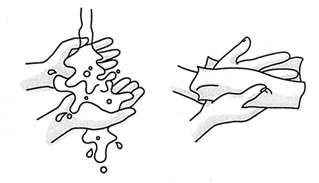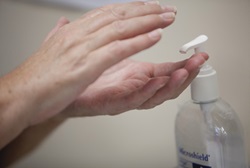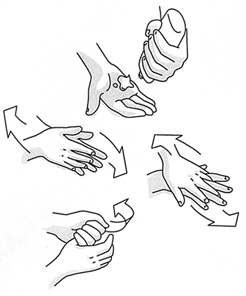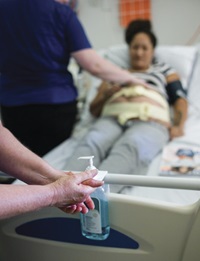Hand hygiene
- Hand hygiene means cleaning your hands with soap and water or an alcohol-based hand sanitiser.
- Proper hand hygiene reduces the spread of germs.
Good hand hygiene is the most effective way to stop infections spreading.
Many infections are caused by spreading germs from person-to-person.
Even when your hands look clean they can still be carrying germs. This is because they are so small that you just can’t see them. This is why when we touch other people or objects we can spread germs without even realising it.
When to wash your hands
You should wash your hands properly and often, especially:
- after you cough, sneeze or blow your nose
- before, during and after preparing food
- after going to the toilet or changing a nappy
- when your hands are visibly dirty
- after smoking
- after handling or patting animals
- before and after taking care of someone who is sick
- when you enter and leave a healthcare facility.
How to wash your hands
Most of us don’t pay attention to how we wash our hands, but it’s important to do it the right way.
Use soap and water
When your hands are visibly dirty, wash them with soap and water.
- Wet your hands and apply the soap.
- Rub the soap all over your hands. Pay attention to the backs of your hands and fingers, fingernails, fingertips, and the webbing between fingers.

- Rinse your hands under running water.
- Pat hands dry with a towel or paper towel.

Using alcohol-based hand sanitiser
If soap and water are not available hand sanitiser can be used.

- Use enough product to cover both of hands.
- Rub all surfaces of your hands. Pay attention to the backs of your hands and fingers, fingernails, fingertips, and the webbing between fingers.

- Rub hands together until dry.
Alcohol-based hand rubs come in small containers which can be carried in your bag or briefcase, or in your pocket. They are ideal for travelling.
Poster
Hand hygiene in healthcare settings
When we are fit and healthy we can usually defend ourselves against germs and infections. Having healthy and intact (unbroken) skin is one of the ways we can do this.
When you are not well, such as after an operation, your ability to fight infection can be weakened. Having an infection in hospital can result in:
- illness
- a longer stay in hospital
- slower recovery
- additional stress for all concerned.
Each time you visit someone in a healthcare facility it is very important that you clean your hands, even if they look clean.
Bottles of hand rub should be located in all patient care areas and in high traffic areas in your healthcare facility.
Working together
Research has shown that improving hand hygiene:
- among healthcare workers can reduce the spread of germs in hospital settings
- protects both patients and healthcare workers
- reduces the number of healthcare associated infections.
Western Australian hospitals have improved access to hand hygiene products for healthcare workers. This involved placing alcohol-based hand rubs within each patient's bed area.
Your healthcare worker should always perform hand hygiene in front of you. If you did not see them do this and are worried, please feel free to remind them.

Translated information about hand hygiene

Arabic – facts about hand hygiene (PDF 1640KB)

Chinese Simplified – facts about hand hygiene (PDF 1387KB)

Chinese Traditional – facts about hand hygiene (PDF 1467KB)

English – facts about hand hygiene (PDF 215KB)

Italian – facts about hand hygiene (PDF 1294KB)
Malay – facts about hand hygiene (PDF 1236KB)

Vietnamese – facts about hand hygiene (PDF 1508KB)
More information
-
National Hand Hygiene Initiative (NHHI)
The WA Health Department and WA public hospitals have participated in the National Hand Hygiene Initiative (NHHI) (external site) since 2009. The initiative is a program developed by the Australian Commission for Safety and Quality in Healthcare to improve hand hygiene in Australian hospitals.
A major part of the initiative is the regular observation and auditing of healthcare worker hand hygiene practices when they care for patients. This information is then fed back to healthcare workers to assist in improving hand hygiene practices.
Western Australia is among the first states in Australia to publicly report this level of data and is committed to informing the WA public about hospital performance.
Read more about WA hand hygiene compliance data (external site).
- For further information contact the Infection Control Unit at your hospital.
- Please direct your queries and correspondence to handhygienewa@health.wa.gov.au
Last reviewed: 03-02-2022
Acknowledgements
Public Health
This publication is provided for education and information purposes only. It is not a substitute for professional medical care. Information about a therapy, service, product or treatment does not imply endorsement and is not intended to replace advice from your healthcare professional. Readers should note that over time currency and completeness of the information may change. All users should seek advice from a qualified healthcare professional for a diagnosis and answers to their medical questions.